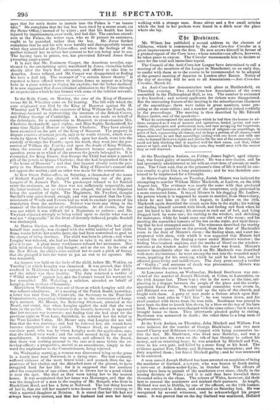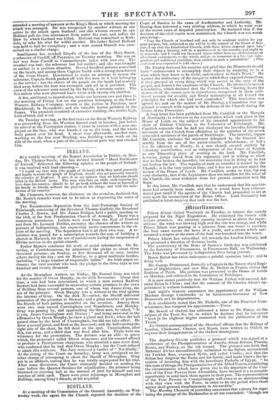be Vrobincts.
Mr. Wilson has published a second address to the electors of Clitheroe, which is commended by the Anti-Corn-law Circular as a great improvement upon the first. He now avows himself in favour of a gradual repeal of the Corn-laws ; whose mischievous effects, however, he takes pains to expose. The Circular recommends him to declare at once for the total and immediate repeal.
The Council of the Anti-Corn-law League have determined to call a meeting of the members of the League in Manchester, on an early day,. to confer with them as to the course to be recommended to be adopted at the general meeting of deputies in London after Easter. Notice of the day of meeting will be sent to all Associations.—Anti- Corn-law Circular, March 25.
An Anti-Corn-law demonstration took place at Huddersfield, on Thursday evening. Two Anti-Corn-law Associations of the town. assembled in the Philosophical Hall, to tea. The number is estimatei at five hundred ; and several applicants for tickets were disappointed. But the interesting feature of the meeting is the miscellaneous character of the assemblage: there were ladies in great numbers, some pre- siding at the cross-tables ; and a number of operatives joined cordially in the proceedings. The meeting is thus described by Mr. Edward Baines junior, one of the speakers— When he contemplated the assemblage which he had then the honour to ad- dress, composed as it was of masters and operatives, landed :gentry and mer- chants, shopkeepers and professional men, and men occupying the important, responsible, and honourable station of ministers of religion—an assemblage, in point of fact, representing all classes, and so large a portion of all classes,—and when, moreover, he saw that assemblage uniting with one heart and with one voice to demand their own rights and justice for the rest of the community,—he could not help thinking that it augured well for their cause, and that, either sooner or later, and he would fain hope soon, they would meet with the success they so well deserved.
At the Huntingdon Assizes, on Friday. James Inglett, aged ninety- four, was found guilty of manslaughter. He was a cow-doctor, and he had ignorantly administered to his wife an over-dose of arsenic as medi- cine. The Court said, that at the prisoner's time of life it would be use- less cruelty to give him a long punishment ; and he was therefore sen- tenced to be imprisoned for a fortnight.
At Shrewsbury Assizes, on Tuesday, Josiah Misters was indicted for attempting to murder William Miller Mackreth, at Ludlow, on the 20th August last. The evidence was nearly the same with that produced before the Magistrates at the time of the occurrence, only presented in a more connected form. It traced Misters in his dogging Mr. Ludlow, the person whom it is supposed be meant to murder, from Shrewsbury, where he met him on the 12th August, to Ludlow on the 19th. Mackreth again described the attack upon him in the night ; his waking and finding himself covered with blood, and feeling raw flesh when he put his hand to his throat ; his attempt to rush out of bed, and being dragged back by some one; his rushing to the window, and shrieking for assistance, while he heard some one slink out of the room ; and his meeting the assembled inmates of the inn on the stairs, and their fancy- ing that he had attempted suicide. The witnesses described the tracing blood in great quantities on the ground, from the door of Mackreth's room to the door of Misters's room ; the finding alum, and water im- pregnated with alum, with which it was supposed that Misters had washed his clothes ; the finding a razor under Misters's window ; the finding bloodstained napkins, and the marks of blood on the window- curtains at the window under which the razor was found. Misters's manner immediately after the attack on Mr. Mackreth was described with more distinctness : he went among the rest into the wounded man's room, inquiring for his stocking, which he said he had lost, and he affected great levity and indifference. The Jury pronounced a verdict of " Guilty ; " and sentence of death was pronounced. Misters was removed from the court in tears.
At Lancaster Assizes, on Wednesday, Richard Boothman was con- victed of the murder of Joseph Halstead, at Collie, in Lancashire, on the 11th August last. There was a riot in the town at the time, ori- ginating in a dispute between the people of the place and the newly- appointed Rural Police. Seventy special constables were sworn in, and Halstead was one. The mob tore up the rails of the church, and fought with them. A party of men made a furious attack upon Hal- stead, with loud cries to "kill him " : he was beaten down, and his skull crushed with blows from the iron rails. Boothman was proved to have been the first to knock him down, by a blow on the top of his bare head. Three other men were charged with the same crime ; but it was not brought home to them. They afterwards pleaded guilty to rioting. Boothman was sentenced to death ; the other three to a long term of imprisonment.
At the York Assizes, on Thursday, John Mitchell and William Fox were indicted for the murder of George Blackburn ; and two men named Cherry and Robinson were charged with being accessories be- fore the fact. Mr. Blackburn, who lived near Barnsley, and was a farmer, went into the town on the 8th of last October to collect his money, and on returning home he was attacked by Mitchell and Fox,. close to his own gate, and killed by a stone flung at his head. The evidence against Fox, Cherry, and Robinson, was incomplete ; and the Jury acquitted them ; but found Mitchell guilty ; and he was sentenced to be executed.
A man named Joseph Holland has been arrested on suspicion of being the murderer of Garland. a sawyer, who was beaten to death during a turn-out at Ashton-under-Lyne, in October last. The officers of justice have been in pursuit of the murderers ever since, chiefly in the mining districts of Wales ; and it is said they have travelled three thousand miles in the chase. The miners of Wales, however, did their best to conceal the murderers and mislead their pursuers. At length, Holland was met in Dublin, by one of the officers, on the 11th instant. He was conveyed to Ashton, and examined on Saturday last.. He was, recognized by several witnesses, and he acknowledged his proper name. It was proved that on the day Garland was murdered, Holland
attended a meeting of sawyers at the King's Head, at which meeting the attack was arranged. He was recognized by another witness as one active in the attack upon Garland ; and this witness swears he saw Holland pull the iron instrument from under his coat, and inflict the blow by which Garland was killed. Holland was committed to Kirk- dale, to take his trial for wilful murder. His father Robert Holland was held to bail for conspiracy ; and a man named Hansell was com- mitted on a similar charge.
Intelligence has reached Lloyd's of the loss of the Mary Stuart, a schooner of Cardiff, off Penzance, on Tuesday morning. She was on her way from Cardiff to Constantinople, laden with iron ore. The weather was bad ; the schooner lost her rudder ; and she was brought to anchor in a perilous situation. Several hundred persons assembled on the beach, and among them Captain Smith with a strong detachment of the Coast Guard. Determined to make an attempt to rescue the schooner, Captain Smith pushed off with five men in a boat belonging to the service : but the cheers of the people on the beach had scarcely died away before the boat was swamped, and all in it perished. The crew of the schooner were saved by the Sylvia, a revenue-cutter. The five sailors who were drowned leave wives with twenty-six children.
A fire, attributed to incendiaries, broke out between two and three in the morning of Friday last on the premises belonging to the South- Western Railway Company, situate at the station at Fareham, near Blackbrook, in Hampshire ; and six valuable horses perished in the flames. The premises consisted of extensive stabling, two stories high, built of brick and wood.
On Tuesday morning, as the first train on the Great Western Railway was proceeding from the Wootton Bassett road to London, just before its arrival at the Farringdon station, it came in contact with a man em- ployed on the line, who was knocked on to the tram, and the whole train passed over his head. A short time afterwards, another man, working on the line near Reading, was finishing some work on the side of the road, when a part of the embankment gave way and crushed



























 Previous page
Previous page